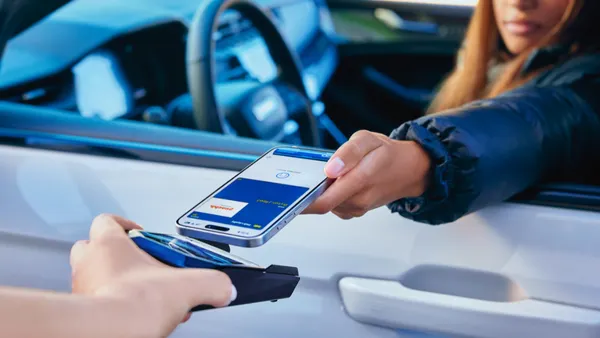UPDATE: Nov. 13, 2018: On Tuesday, Sweetgreen closed a $200 million funding round led by Fidelity Investments. The fast-casual salad chain is now valued at over $1 billion, and plans to use the investment to improve its Outpost delivery platform and supply chain traceability, CEO Jonathan Neman told Forbes.
Dive Brief:
- Los Angeles-based Sweetgreen is reportedly close to securing $200 million in funding led by Fidelity Investments. CNBC reports this funding round would value the fast casual salad chain above $1 billion.
- Sweetgreen was founded in 2007 and now includes 90 stores featuring locally-sourced ingredients and seasonal menus, as well as a culture that is focused on health and sustainability.
- This funding would add to the robust investment environment in the food space this year. According to a recent report by PitchBook, venture capital investments are expected to top $100 billion in 2018, on pace to generate more capital than any other year since 2006.
Dive Insight:
One billion dollars is quite the valuation for a chain that is just 11 years old and boasts only 90 locations. For context, 46-year-old Popeyes (which has more than 2,600 locations) was acquired by RBI for $1.8 billion in 2017. But something about Sweetgreen has excited investors more than its competitors — like Just Salad, Salata and Chop’t — in the fast casual salad segment.
The concept hits on a number of consumer trends, such as healthier eating and sustainability, but such demands don’t typically inspire $1 billion bets. As Fortune outlines, unicorn companies — or startups that hit the $1 billion valuation mark — tend to be fast-growing, venture-backed companies focused on technology.
So, while it may seem unusual for a restaurant company that is focused on salads to hit the unicorn mark, a deeper look into Sweetgreen’s background adds some justification. Arguably, the company is just as much a tech company as it is a restaurant company. The brand has an in-house tech team, has launched several digital initiatives such as cashless stores, and one of the concept’s early investors was AOL co-founder Steve Case.
The company is also piloting a program called Outpost, which delivers customized orders to kiosks located in corporate headquarters, and is rolling out on-demand delivery. Sweetgreen’s digital ordering platform generates nearly 50% of all orders, a number that is on par with major restaurant brands that have much deeper pockets. In an interview with Forbes Tuesday, Sweetgreen CEO Jonathan Neman said that expanding Outpost, investing in blockchain technology to bolster supply chain traceability and improving personalization are of particular focus moving forward.
"We want to go beyond a food company and become a platform," Neman told Forbes after closing the funding round. "We want to take all of the things we've built for ourselves — our best-in-class supply chain, operating model, our ordering channel, etc.— and use that to expand out into other food categories and expand the platform closer to customers’ homes.”
Perhaps Sweetgreen is taking a page from Domino’s, which has referenced itself as a “tech company that sells pizzas” for years. This approach has led to 29 consecutive quarters of positive comp sales for Domino’s, and has tripled its stock value in the past 10 years.
Of course, tech prowess alone doesn’t necessarily mean Sweetgreen will prove to be worth $1 billion. Salads, after all, not only remain very niche, but they’re also risky from a food safety perspective. Still, investors clearly see potential and as the company keeps growing and innovating, there aren’t many reasons right now to doubt them.










